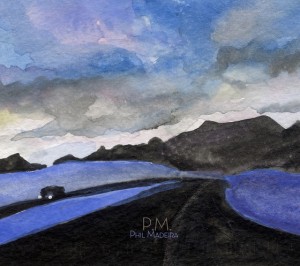 All I can say is, thank God for Phil Madeira. The past ten years have been odd ones for this thing we’ve decided to call “Americana.” Ostensibly, it was a trendier classification for Folk music, which in part due to the 1960’s wound up having more a reputation for being protest music. Americana as such was, I assume, meant to bring a sense of balance back. The sub-genre regularly features acoustic instruments, has its stylistic ankles firmly submerged in the folk and country music traditions, and did not forget that at the heart of this “roots music” is the blues, as so much of the output speaks of and to heartbreak, hard times, and lonesome trails.
All I can say is, thank God for Phil Madeira. The past ten years have been odd ones for this thing we’ve decided to call “Americana.” Ostensibly, it was a trendier classification for Folk music, which in part due to the 1960’s wound up having more a reputation for being protest music. Americana as such was, I assume, meant to bring a sense of balance back. The sub-genre regularly features acoustic instruments, has its stylistic ankles firmly submerged in the folk and country music traditions, and did not forget that at the heart of this “roots music” is the blues, as so much of the output speaks of and to heartbreak, hard times, and lonesome trails.
But a lot changed from 2003 to 2013, and in specific, the country pop from Nashville’s hitmakers grew ever more bogged down by the hambone conventions that always plagued it in small degrees. The topics seemed to circle exclusively around: my truck, my bar, my girl, my girl what left me, my bar what closed down, and I’m an American so screw you. As an antidote, Americana emerged, largely from the alt-country and bluegrass bands that listeners started gravitating to. Mandolin and dobro players were finally able to show off serious chops, and the narratives in the songs went to a more honest, sometimes darker place…and that was good.
In the present moment though, as this neo-folk thing is bounding for a tipping point, it too is dealing with dogged tropes of its own. For example, a lot of the new emerging artists have come to use their music as catharsis, and that’s not a bad thing in and of itself, but it’s becoming caricature. Twenty years ago, these same young artists would have picked up loud guitars and been “grunge,” but have found a following instead in this sound. And aside from being a drag, it feels thoroughly inauthentic. These have not lived long enough to know what being down and out really feels like, no matter how bedraggled their biographies may be. I have found myself, listening to albums sent by music services for review, dreading that first slide of steel guitar or that first mandolin strum because I’m 80% sure it’s going to be another set of misery ballads.
So yes, thank God for Phil Madeira who brings it all back to a real place, previously with his Mercyland project and now with his latest solo record PM. Madeira has played with some of my favorite artists from all times, from Emmylou Harris to Terry Taylor. His previous solo efforts deliver him as a clever, talented storyteller with skills in multiple instruments, and when he sings, he does so with a voice that says to the lister, “I’ve seen these things.” In other words, Madeira offers authenticity in a moment where it is fashionable to make up like you’ve been through some heavy “stuff.”
In the mid-section of this record, you have the prime example of what I mean in “Waiting On A Slow Train” which sounds like a rumble on a train that is piercing an ominous, indigo horizon. But it’s not all dire stuff. Madeira’s humor also comes through on his “Bad Sense Of Direction” which appeared previously on Kerosene Halo’s debut. Playing with words and intentions of words makes the opening “God On The Rocks” a puzzle to put together on its own. Is this an analogy for redemption, or the ballad of someone looking for relief in rough places? That, as they often say, depends solely upon the listener, and I have to thank Madeira again for not spelling out the whys and wherefores, as so many others do lately in an almost condescending fashion. Madeira the songwriter has enough confidence in the audience to let them fill in-between the lines.
The closing “Lonesome Owl” is, despite the instrumentation, actually a kind of rocker that gets there in a graduated build, which is entirely appropriate. The line, “I hear the Spirit calling me, she’s a lonesome owl” again plays off of several concepts. The one I gravitate to is the “still, small voice” in the soul that guides one to “the light” whereas another listener with a different set of recollections to draw from might hear it as the “spirit of the west” or of hope that resides in the nighttime of hardships.
PM is not afraid to mix it up with contrasts, and although there are ballads to be found, they are not miserable for the benefit of misery. They are stories being told by someone with a special gift for telling them, and because of that, this is one of the more “real” collections I’ve heard in a while.
You can purchase PM from Phil Madeira’s site: http://www.philmadeira.com





Comments